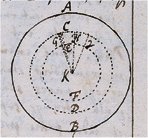
Cambridge University Library, Ms. Add. 4003, f. 22r
The first three folios of this notebook are blank. The next forty pages have been numbered by Newton, who also ruled the margins of folios four to thirty-one. The forty numbered pages (or twenty folios) were used at some point by Newton for the composition of an essay entitled 'De Gravitatione et aequipondio fluidorum et solidorum in fluidis' ('On the Gravity and Equal Weight of Fluid and Solid Bodies in Fluids'). The rest of the notebook was left blank.
'De gravitatione' is one of Newton's most important essays. It probably dates from winter 1684 or early spring 1685, since its contents suggest some familiarity with the tract 'De motu' but do not hint at the revisions that Newton soon made to it (see catalogue numbers 42 and 16).
It provides the clearest evidence of Newton's break with Cartesian physics at the time of the composition of the Principia. Unusually careful and exact citations from Descartes' works accompany Newton's criticisms. Moreover, the argument of 'De gravitatione' depends in part on the results of pendulum experiments that Newton probably conducted during 1684. These experiments suggested that resistance due to penetration by the aether was very small, whereas, when he had written to Boyle in November 1679, Newton had believed that it was sufficient to explain the repulsion of one body by another (see catalogue number 45).
In denying that motion might simply be the result of the pressure of small particles on larger bodies, Newton rejected Descartes' relative interpretation of matter and space. In its place, he suggested that space must be understood in absolute terms. Only infinite space and finite matter were compatible with divine creation. The pages from 'De gravitatione' that are on display (figure 27) illustrate this argument. In a discussion of non-elastic fluids, Newton proposed that 'compression does not cause a motion of the parts among themselves'.
He went on
to demonstrate this with the aid of a diagram that showed that
'moreoverů all the parts exert pressure on each other equally and they do so with the same intensity of pressure as is exerted upon the external surface.'
The composition of 'De gravitatione' therefore represented a break with Newton's earlier writing about the aether. Although Newton decided that the straightforward effects of matter in motion could not explain the action of gravity, he did not abandon theories based on the aether entirely. Instead he modified them to take into account of his notion of force and continued to suspect that something like a rarefied aether might explain the behaviour of light, electricity, and other phenomena, perhaps including gravity itself.

back to the top
|

